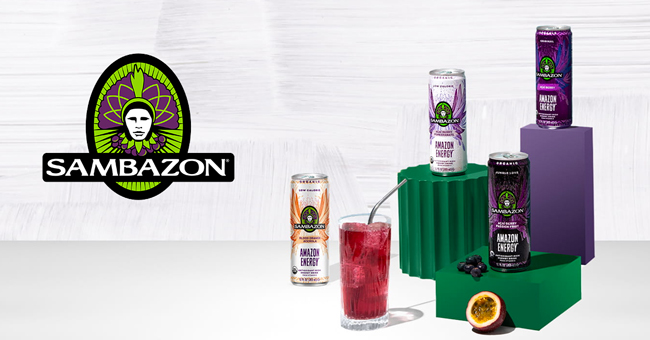Acai food and beverage brand Sambazon announced yesterday it had secured a $45 million investment from NextWorld LLC through its growth equity fund NextWorld Evergreen LP. The company will use the new funding to grow its omnichannel presence, expanding across retail and ecommerce while also growing its cafe business.
Two members of the NextWorld team — managing partner David Fife and partner Tiffany Obenchain — will join Sambazon’s board of directors as part of the deal. The funding round follows an $8 million funding round closed in December 2020, and brings the company’s total net capital raised to date to $60 million, according to co-founder and CEO Ryan Black. A portion of the minority investment was used to exit long-term investors, Black said.
“It was time to accelerate our next stage of growth with a mission aligned partner who valued our vertically integrated supply chain and how we aim to translate that positive vibration into both on- and off-premise retail locations,” Black said. “Nextworld’s vision and commitment to both profit and purpose was a perfect fit.”
Sambazon first launched in 2000 with acai-based juices, energy drinks and ready-to-drink smoothies, and expanded into food with frozen superfruit packs and sorbets. It has shifted its focus from beverages in recent years, doubling down on better-for-you frozen treats with the launch of vegan frozen acai bites in 2018 and ready-to-eat acai bowls introduced last summer. Its organic and fair trade products are sold in over 25,000 locations across natural and conventional grocery and club channels in 45 countries, and it also operates a cafe in Cardiff, California. Sambazon has established a vertically integrated supply chain for its berries and a manufacturing facility in Brazil, using recent funding to triple its production capacity, including constructing a second manufacturing plant in the Brazilian Amazon Rainforest.
Fife was first connected with Sambazon through the company’s board members and CPG veterans Alan Murray and Blair Kellison, first meeting with Black last summer. As a mission-driven brand with a strong growth rate, Sambazon “checked a lot of boxes” for NextWorld, whose investment portfolio also includes sustainable chocolate maker Alter Eco and ice cream brand Van Leeuwen, Fife said. While the company has been around for over 20 years, its latest growth and place as a leader in acai in multiple channels made now the right time to invest, according to Fife. As an evergreen fund, NextWorld will be able to “be patient and think long term” about Sambazon’s growth, Fife said, noting that the company grew its sales by 20% over the past year and is on track to do over $100 million in sales this year.
“[Black] was looking to continue to accelerate the growth away from just being a juice company into being more of a solid CPG omnichannel platform play and was looking for an investor that was aligned around that,” Fife said.
Going forward, Fife said he and NextWorld will be very active in the company, with NextWorld positioning itself as the “long term capital partner” to the founders. NextWorld aims to “reboot the board” with new members, as Fife said he and Obenchain are ready to “hit the ground running” as the company enters its next growth phase.
This next growth phase starts with doubling down on its CPG business as it builds its presence in MULO and natural, Fife said. This also means launching new products: the brand is growing its frozen treat offerings with the launch of Acai Smoothie Pops, offered in Blueberry and Strawberry Banana flavors, which have rolled out exclusively at Whole Foods, the company announced this week.
For future innovations, the company will shift its attention from the drink cooler. Black said the company will aim to launch frozen fruit and frozen breakfast items, as well as plant-based novelties and snacks.
“We believe that convenience and organic nutrition coupled with the delicious powers of açai are, and will continue to be, a winning combination,” Black said.
Beyond CPG, the company is also focusing on its cafe business. According to Black, it will use the new funding to launch the Sambazon Hospitality Group, launching Acai Bowl Shops and Kiosks this year offering acai bowls and smoothies. It recently revamped its Cardiff, California cafe as a prototype for this venture, which could include company-owned locations and eventually a franchise model, Fife said. This combination of grocery and physical cafe and shops has proved to be a lucrative model for brands, particularly for its portfolio company Van Leeuwen, Fife noted.
It’ll also be rolling out “turnkey branded concepts” of its acai bowls in foodservice, Black said, that can be used by other cafes and shops.
“In an omnichannel world, one of the best ways to drive your velocities — because everyone talks about selling, but it’s really about sell through — is the combination of having physical retail and on the shelf CPG products,” Fife said.
While the company was previously resistant to establishing an ecommerce business due to the environmental impacts of frozen shipping, Sambazon will be launching its own online store with “innovative, eco-friendly” packaging this spring, Black said.
Establishing a strong presence across these channels will ultimately be the key to success for the company going forward, Fife said, as he believes investors can no longer “just invest in something that you throw in the natural channel and then hope to flip it to a strategic kind of thing.”
“You’ve got to build broad-based businesses that have multiple legs of the stool,” he said. “And that’s what we’re trying to do with Sambazon.”
